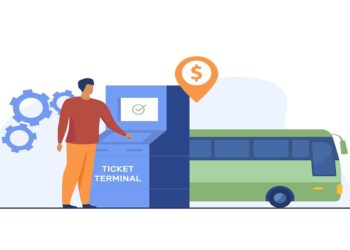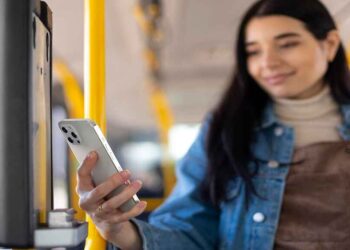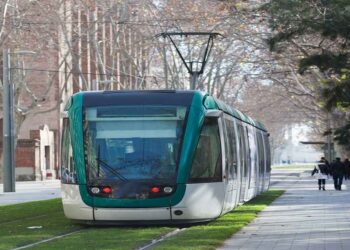On 12 June 2006, a new parking system was introduced so that passengers can pay for railway station car-parking with their mobile phones.
Innovative train operator First Great Western had rolled out cashless parking at more than 60 station car parks that allowed passengers to buy tickets with their mobile phones. The travellers can call through with their credit or debit card details giving the car park number, location number and their vehicle and payment details.
Following this initial ‘registration call’, subsequent calls only require the location and length of stay. These calls are fast tracked, taking between 30 seconds and a minute to process. The system has obvious advantages as there is no cash involved at all and the system is completely automated; business travellers who require VAT receipts can download them from the parking company website.
RingGo is the consumer brand under which Cobalt provides what is the UK’s dominant cashless parking system. APCOA, the administrator of First Great Western railway car parks, selected Cobalt Telephone Technologies and Spur Information Solutions as its systems suppliers for the project.
RingGo is the consumer brand under which Cobalt provides what is the UK’s dominant cashless parking system. APCOA, the administrator of First Great Western railway car parks, selected Cobalt Telephone Technologies and Spur Information Solutions as its systems suppliers for the project.
Cobalt supplied RingGo and Spur Solutions supplied the handheld equipment. APCOA’s Parking Attendants used it to monitor and enforce parking on the line.
Effective from the midnight of 13 March 2011, RingGo is no longer offered at FGW, Network Rail and APCOA sites.
System benefits
One great benefit of the system is it includes a summary text message, reminding drivers that their session is about to run out ten minutes before it expires. Passengers are then able to extend their parking time by phoning back from wherever they are.
Parking attendants administrating the system can check number plates with an automatically update handheld PDA device, using a wireless GPRS-based data system to ensure drivers have a valid mobile ticket.
The system was trialled first at Bristol Parkway station and was rolled out at over 63 stations throughout the south and west of England, including Exeter, Bristol and Bath. One of the final stages of the rollout of RingGo by First Great Western took place on the 23 April 2007 with the long-awaited introduction of RingGo to Oxford station.
RingGo system
The First Great Western station car parks were run by APCOA, which decided to install the RingGo payment system. RingGo is being rolled out across the UK and it is being offered in towns, cities and railway stations. Parking fees are calculated centrally. Accurate tariff modelling means that RingGo customers only ever pay exactly what they owe.
Service users paid a small convenience charge on top of the normal parking fee. This amount was usually 20p or 30p. On 1 May 2007, First Great Western abolished this convenience charge at all stations. Often using RingGo is cheaper than cash. The RingGo symbol is displayed wherever the system is operating and tariff boards clearly state the telephone number.
How to use it
The number variesbut, in all cases, is an ordinary local number.
Prompted by the spoken instructions, key-in the four-digit car park location number that is unique to that car park and the space.
The location will always be confirmed back to the user. They must then choose the duration of the stay and finally details of the preferred payment card.
Once payment has been authorised the session has begun. By also setting up a PIN (Personal Identification Number) the customer will be fast-tracked the next time they call, as most of the data will already be stored. The RingGo service, infrastructure, brand and trademark are owned by Cobalt Telephone Technologies.
Metric group
In April 2007, Metric Group and Cobalt Telephone Technologies, owners of the RingGo brand, announced a commercial understanding to offer parking authorities a suite of parking solutions that integrates Pay & Display machines and a mobile phone-based means of payment.
Joachim Oehmen, Managing Director of the Metric Group, said, “This partnership will allow a parking manager to implement phone parking with confidence – with the added bonus of having a single source audit facility via our ASLAN networked central management system.”
Where RingGo works
RingGo is used in various locations across the country.
It is available at Bournemouth (available in 45 car parks), Christchurch and London Borough of Hounslow Pay & Display (P&D) car parks and selected CP Plus car parks and Roadchef motorway service stations.
RingGo negates vandalism and robbery of installations but requires a call centre (centralised) and also a team of inspectors with PDA devices updated from central control.
London rollout
The first major award of a contract by a London Borough was secured in November 2006 when Hounslow chose to deploy RingGo as an alternative means of payment across all its surface car parks and street bays. Hounslow is known for its leadership in the field of customer service and this initiative represented the largest roll-out of phone parking undertaken anywhere in London.
The Hounslow roll out was completed in March 2007. The same occurred in Southwark and now almost 100 on-street Pay & Display Briparc machines display RingGo signage – covering the three major zones of Bankside, Borough and London Bridge. Every one of the on-street spaces in this sizeable tract of Central London – was offered the option of mobile phone parking by January 2008.
The area covered by RingGo includes a fashionable and vibrant stretch of the south bank of the Thames whose attractions include Southwark Cathedral, Tate Modern, the Globe Theatre and Borough Market.
Westminster
Westminster conducted a successful trial of the RingGo system across 400 spaces (Soho, Harrow Road, Convent Garden, Queens Park) in October 2006. The trial was a great success, with over 75% of drivers using the system expressing a clear preference for it.
In December 2007, however the Westminster-led Partnerships in Parking (PiP) initiative did not choose RingGo as its future phone parking provider.
































